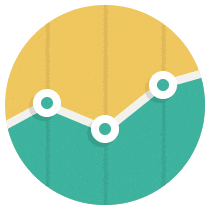Launching your online store is only half the battle when it comes to ecommerce success. Merchants have to market their websites to drive traffic, which ultimately leads to sales.
This is where digital marketing comes into play. Digital marketing is an excellent way to build buzz about your brand and products, earn trust from your audience, and push people to your online store to eventually make a purchase—and return in the future for more.
Digital marketing is an extremely powerful tool for ecommerce brands when approached strategically. Rather than spreading yourself thin and trying all the channels at once, start with intention. Consider your business goals, your budget, and your target audience. Let’s take a look at how you can use digital marketing to promote your online business.
What is digital marketing?
Digital marketing is the act of promoting a brand, product, and/or service through paid and organic advertising efforts on online platforms. Digital marketing encompasses pretty much any online promotion of your ecommerce business.
Brands don’t have to be the ones putting out the messaging—savvy online brands also let their customers do the talking for them. So if a customer posts a glowing review online about your product or makes a positive social media mention about your brand, these examples are also forms of digital marketing.
More than three-quarters of businesses actively use marketing campaigns to promote their brands. The most common marketing goals for those businesses include increased brand awareness, sales, engagement, leads, and revenue—all of which can be achieved through strategic digital marketing.
Free Webinar:
Marketing 101
Struggling to grow sales? Learn how to go from first day to first sale in this free training course.
Setting a digital marketing strategy
A well-rounded digital marketing strategy encompasses multiple channels. Generally speaking, most brands use a combination of Facebook, Instagram, email, and SEO, among others. The channels that work for your brand largely depend on where your target audience hangs out, what your budget is, and what your business goals are.
Now let’s look at how you can use some of the most popular and effective digital marketing channels to promote your online business.
Social media marketing
Social media marketing is a great way to engage with existing customers and build relationships with new ones. Social media refers to all the channels out there—including the major players like Facebook and Twitter, as well as niche sites like Houzz and Twitch. Some of the main social media platforms to check out include:
You can create organic social posts on each of these networks. Organic social posts are updates you post to your brand’s page(s) without any paid promotion. It’s typically best to go with a mix of engaging and promotional content with organic posts, skewing more toward engaging content. Too many self-promotional posts may inspire unfollows.
As an example, home goods merchant MADRE Linen has a curated Instagram feed that features lifestyle shots and product images:
However, with organic posts, your reach and engagement are entirely dependent on algorithms. To reach more people and guarantee more views of your social media content, you can explore adding paid social ads into your digital marketing mix. Each of the major platforms offers its own advertising opportunities with a variety of options.
To get started, we put together some resources on running paid social ads:
Facebook ads
Instagram ads
Pinterest ads
You can also check out these resources to help you capitalize on your social media plan:

Free: Social Media Strategy Template
From choosing your channels to figuring out what to post, fill in the blanks to think through how you can best use social media to meet your marketing goals.
Get the social media strategy template delivered right to your inbox.
Almost there: please enter your email below to gain instant access.
We’ll also send you updates on new educational guides and success stories from the Shopify newsletter. We hate SPAM and promise to keep your email address safe.
Email marketing
Email is a prominent digital communication tool that people use to communicate with one another and with businesses. And according to the Forrester Analytics: Email Marketing Forecast, 2018 To 2023 (US), email usage is on the rise. About 96% of people 12 years and above use the digital channel, and more and more are willing to sign up for businesses’ promotional emails. However, there’s an increasing dissatisfaction with branded emails—which means there’s more opportunity for the brands who do it well.

Plus, email is an effective means of reaching consumers young and old. In fact, more online users between the ages of 12 and 17 prefer email to Snapchat and Facebook.
You can use email to send a mix of promotional and non-salesy content—newsletters with helpful content about how to use your products, exclusive discounts for your email list, early announcements, and access to special sales. Spirit of the Herbs shared an exclusive discount code with its list in an attempt to boost sales:

Use email marketing software to build customer profiles and segment your list so you can create personalized email campaigns.
Get more info on how to use email in your digital marketing strategy:
Search engine marketing and optimization
Search engine marketing (SEM) and search engine optimization (SEO) refer to practices with the intent of increasing your website’s visibility and findability through online search engines. SEM refers specifically to paid tactics, while SEO refers to organic, or non-paid, efforts.
One report estimates online businesses will earn 35% of total traffic and 33% of revenue from search engine result pages (SERPs). Though there are many search engines out there, Google dominates by far and is thus the search engine most businesses prioritize.
As far as SEM goes, you can run pay-per-click (PPC) display ads through the Google Ads dashboard, targeting specific keywords for queries in your chosen locations. Your budget may vary depending on your goals and keyword competition, but there’s always an option for every budget.
LOVBYT, which sells cruelty- and chemical-free toothpaste, uses SEM in its digital marketing mix. It’s bid on the keyword phrase “organic toothpaste” so it appears at the top of SERPs for search queries with those words.

Learn more about incorporating organic SEO into your digital marketing strategy:

Free Download: SEO Checklist
Want to rank higher in search results? Get access to our free, checklist on search engine optimization.
Get our SEO Checklist delivered right to your inbox.
Almost there: please enter your email below to gain instant access.
We’ll also send you updates on new educational guides and success stories from the Shopify newsletter. We hate SPAM and promise to keep your email address safe.
Content marketing
Content marketing is when businesses create and/or curate content to promote their business. For many, content marketing takes the form of a blog. In fact, more than half of marketers use blogs in their digital marketing mix. Content is effective for building relationships with new and existing customers, generating awareness about your brand and products, boosting SEO, and establishing authority in your chosen niche.
CBD and hemp oil brand Cerena has a blog called Cuentos (Stories) on its website. Here, it publishes information about its industry and how people can use its products in their lives.

Here are some resources to get you started with content in your digital marketing strategy:
Marketing automation
Marketing automation is when you use technology to create a set of rules that trigger automated actions from your marketing platforms. Marketing automation could be limited to a single platform in your tech stack or involve a combination of tools via integrations. The Shopify App Store, for example, has lots of marketing automation apps you can add to your ecommerce site.

You can also create marketing automation campaigns directly from your Shopify dashboard. One example of a marketing automation that most ecommerce brands can leverage is the post-purchase automation. Depending on your product and the purchase, you can use post-purchase communication as a way to nurture customer relationships and cross-sell other products through personalized recommendations.
Add behavioral retargeting to your digital marketing mix with these resources:
Remarketing
Remarketing, or behavioral retargeting, is when you market to people who have already had some sort of experience with your brand. You can set up retargeted marketing campaigns that are informed and targeted based on your audience’s previous behavior.
Here’s what that might look like in action: Maybe you launched a collection of artist-designed mugs for your home-goods business. A few months after the mugs, you collaborated with a different artist on a new mug design. You can remarket to the people who purchased your first artist-designed mug knowing they already have an interest in this type of product.
Here’s another resource to get you started with remarketing in your digital marketing strategy:
Kick start your digital marketing strategy with Shopify
Shopify has built-in marketing tools you can use to get started with your digital marketing campaigns. There are tools for audience targeting, email marketing, SEO, paid social ads, and more. Plus, you can improve your marketing efforts with actionable insights that reduce guesswork and make campaigns better over time. With Shopify, you can use one platform to find and sell to the right shoppers, wherever they are.



